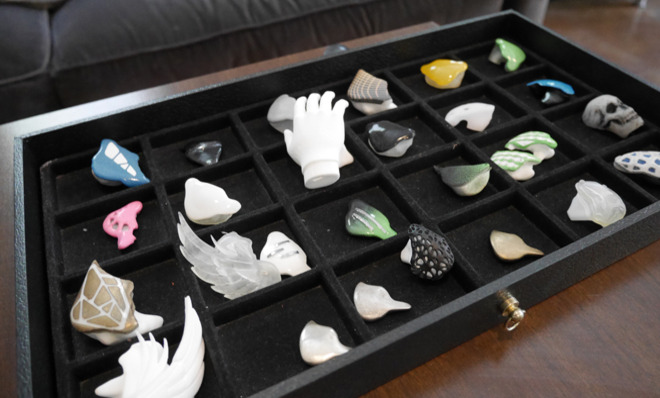What these custom, 3D-printed earphones say about the future of consumer technology
Ownphones is a new company that makes earphones molded to the shape of your ear. And this is just the beginning.

A free daily email with the biggest news stories of the day – and the best features from TheWeek.com
You are now subscribed
Your newsletter sign-up was successful
Last Friday, I visited a nondescript building in the middle of San Diego's Little Italy, where the future was being printed out on a machine smaller than a microwave oven.
Through a door labeled "Design" was a messy space filled with lots of stuff; nothing particularly noticeable, just stuff. But in the back corner was a gadget that was producing custom-fitted earbuds.
Ownphones is in the midst of a crowd-funded campaign to become one of the first companies to mass-produce a custom 3D-printed consumer product. Each pair of earbuds is Bluetooth-enabled, and is molded according to the shape of your ears.
The Week
Escape your echo chamber. Get the facts behind the news, plus analysis from multiple perspectives.

Sign up for The Week's Free Newsletters
From our morning news briefing to a weekly Good News Newsletter, get the best of The Week delivered directly to your inbox.
From our morning news briefing to a weekly Good News Newsletter, get the best of The Week delivered directly to your inbox.
First, your ears are scanned with a standard iPhone. The video clip is sent to a server, which turns them into 3-D images that a fancy algorithm renders into a printable design. The design is then printed out of plastic in a little over an hour using the company's prototype equipment. The electronics then get mounted inside, at which point you have wireless earbuds that fit perfectly.
3D printing isn't new, but consumer-printed products are still a nascent industry. In this new world, I wouldn't even have to visit the Ownphones office to scan my ears. I would just open an app on my mobile phone, send the image or video directly to the company, and receive the earbuds a few days later in the mail. It's a dramatic change from the current process of getting custom-fitted earbuds, which is time-consuming and expensive.
Normal is another company that is 3D-printing earphones, the big difference being they are wired. Normal seems to be a little further along in the process, with consumers already able to pre-order for an August delivery.
Almost every smartphone ships with a pair of cheap earbuds, and the problem is always the same: they just don't fit well. Both Normal and Ownphones are taking advantage of 3D printing reaching maturity to fix this problem.
A free daily email with the biggest news stories of the day – and the best features from TheWeek.com
To most consumers, 3D printing is still a vague idea that overlaps with the realm of science fiction. To create a three-dimensional object out of thin air is wild. It's hard enough to grasp the concept, let alone the idea this may be in their homes in the next five to 10 years.
It may not even take that long, however. MakerBot, now owned by Stratasys, has been pushing towards consumer use by making 3D printers cheaper. In addition to its digital store — where it offers pre-designed items that you can pay for and print out — MakerBot is partnering with Home Depot to sell the Replicator Mini for $1,375. Other companies are also preparing to sell such printers, which could bring down their cost even further.
As I talked with Ownphones founder Itamar Jobani, I was struck by how imminent this new on-demand world is. "The combination of the declining price of the 3-D printer as well as the availability of more and more materials, creates a competitive edge to 3D printing over traditional methods of manufacturing," he said, "thus allowing 3-D printing to get into more and more industries."
Indeed, every industry seems ripe for an upheaval in which consumers can easily and quickly design and create objects. Shapeways, for example, is a digital store that has objects available for custom printing that span various interests, including jewelry, smartphone cases, board games accessories, and even drone parts. Just imagine what else is possible, as customers grow tired of a one-size-fits-all mentality.
Tyler Hayes is a freelance writer living in Southern California. He's just as obsessed with discovering new music as he is with trying new technology.
-
 Sepsis ‘breakthrough’: the world’s first targeted treatment?
Sepsis ‘breakthrough’: the world’s first targeted treatment?The Explainer New drug could reverse effects of sepsis, rather than trying to treat infection with antibiotics
-
 James Van Der Beek obituary: fresh-faced Dawson’s Creek star
James Van Der Beek obituary: fresh-faced Dawson’s Creek starIn The Spotlight Van Der Beek fronted one of the most successful teen dramas of the 90s – but his Dawson fame proved a double-edged sword
-
 Is Andrew’s arrest the end for the monarchy?
Is Andrew’s arrest the end for the monarchy?Today's Big Question The King has distanced the royal family from his disgraced brother but critics claim a ‘fit of revolutionary disgust’ could still wipe them out